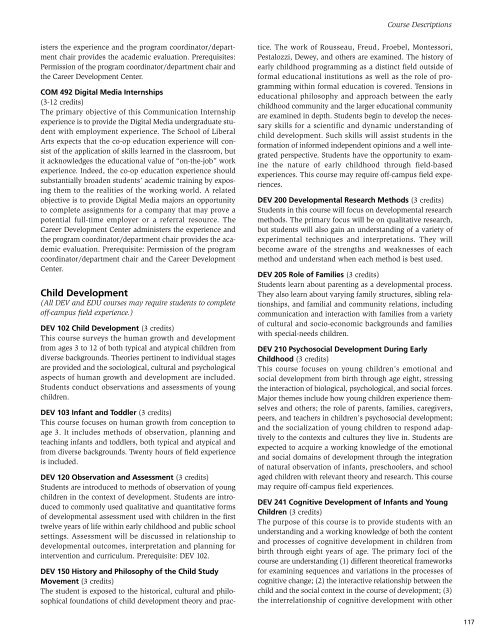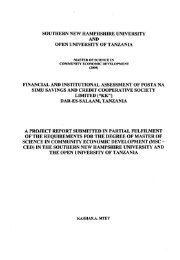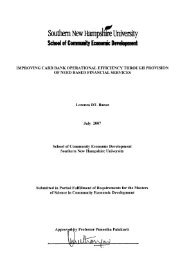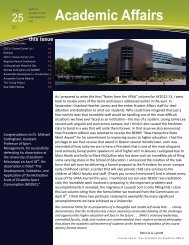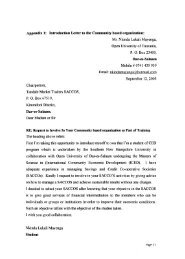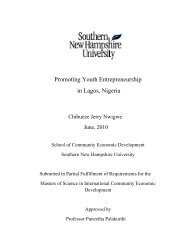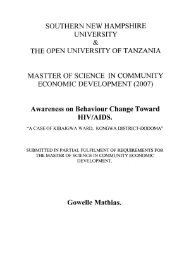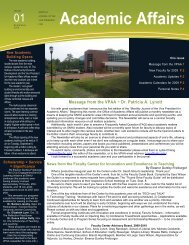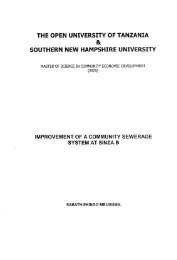Undergraduate Catalog 2010-2011 - SNHU Academic Archive ...
Undergraduate Catalog 2010-2011 - SNHU Academic Archive ...
Undergraduate Catalog 2010-2011 - SNHU Academic Archive ...
You also want an ePaper? Increase the reach of your titles
YUMPU automatically turns print PDFs into web optimized ePapers that Google loves.
Course Descriptions<br />
isters the experience and the program coordinator/department<br />
chair provides the academic evaluation. Prerequisites:<br />
Permission of the program coordinator/department chair and<br />
the Career Development Center.<br />
COM 492 Digital Media Internships<br />
(3-12 credits)<br />
The primary objective of this Communication Internship<br />
experience is to provide the Digital Media undergraduate student<br />
with employment experience. The School of Liberal<br />
Arts expects that the co-op education experience will consist<br />
of the application of skills learned in the classroom, but<br />
it acknowledges the educational value of “on-the-job” work<br />
experience. Indeed, the co-op education experience should<br />
substantially broaden students’ academic training by exposing<br />
them to the realities of the working world. A related<br />
objective is to provide Digital Media majors an opportunity<br />
to complete assignments for a company that may prove a<br />
potential full-time employer or a referral resource. The<br />
Career Development Center administers the experience and<br />
the program coordinator/department chair provides the academic<br />
evaluation. Prerequisite: Permission of the program<br />
coordinator/department chair and the Career Development<br />
Center.<br />
Child Development<br />
(All DEV and EDU courses may require students to complete<br />
off-campus field experience.)<br />
DEV 102 Child Development (3 credits)<br />
This course surveys the human growth and development<br />
from ages 3 to 12 of both typical and atypical children from<br />
diverse backgrounds. Theories pertinent to individual stages<br />
are provided and the sociological, cultural and psychological<br />
aspects of human growth and development are included.<br />
Students conduct observations and assessments of young<br />
children.<br />
DEV 103 Infant and Toddler (3 credits)<br />
This course focuses on human growth from conception to<br />
age 3. It includes methods of observation, planning and<br />
teaching infants and toddlers, both typical and atypical and<br />
from diverse backgrounds. Twenty hours of field experience<br />
is included.<br />
DEV 120 Observation and Assessment (3 credits)<br />
Students are introduced to methods of observation of young<br />
children in the context of development. Students are introduced<br />
to commonly used qualitative and quantitative forms<br />
of developmental assessment used with children in the first<br />
twelve years of life within early childhood and public school<br />
settings. Assessment will be discussed in relationship to<br />
developmental outcomes, interpretation and planning for<br />
intervention and curriculum. Prerequisite: DEV 102.<br />
DEV 150 History and Philosophy of the Child Study<br />
Movement (3 credits)<br />
The student is exposed to the historical, cultural and philosophical<br />
foundations of child development theory and practice.<br />
The work of Rousseau, Freud, Froebel, Montessori,<br />
Pestalozzi, Dewey, and others are examined. The history of<br />
early childhood programming as a distinct field outside of<br />
formal educational institutions as well as the role of programming<br />
within formal education is covered. Tensions in<br />
educational philosophy and approach between the early<br />
childhood community and the larger educational community<br />
are examined in depth. Students begin to develop the necessary<br />
skills for a scientific and dynamic understanding of<br />
child development. Such skills will assist students in the<br />
formation of informed independent opinions and a well integrated<br />
perspective. Students have the opportunity to examine<br />
the nature of early childhood through field-based<br />
experiences. This course may require off-campus field experiences.<br />
DEV 200 Developmental Research Methods (3 credits)<br />
Students in this course will focus on developmental research<br />
methods. The primary focus will be on qualitative research,<br />
but students will also gain an understanding of a variety of<br />
experimental techniques and interpretations. They will<br />
become aware of the strengths and weaknesses of each<br />
method and understand when each method is best used.<br />
DEV 205 Role of Families (3 credits)<br />
Students learn about parenting as a developmental process.<br />
They also learn about varying family structures, sibling relationships,<br />
and familial and community relations, including<br />
communication and interaction with families from a variety<br />
of cultural and socio-economic backgrounds and families<br />
with special-needs children.<br />
DEV 210 Psychosocial Development During Early<br />
Childhood (3 credits)<br />
This course focuses on young children’s emotional and<br />
social development from birth through age eight, stressing<br />
the interaction of biological, psychological, and social forces.<br />
Major themes include how young children experience themselves<br />
and others; the role of parents, families, caregivers,<br />
peers, and teachers in children’s psychosocial development;<br />
and the socialization of young children to respond adaptively<br />
to the contexts and cultures they live in. Students are<br />
expected to acquire a working knowledge of the emotional<br />
and social domains of development through the integration<br />
of natural observation of infants, preschoolers, and school<br />
aged children with relevant theory and research. This course<br />
may require off-campus field experiences.<br />
DEV 241 Cognitive Development of Infants and Young<br />
Children (3 credits)<br />
The purpose of this course is to provide students with an<br />
understanding and a working knowledge of both the content<br />
and processes of cognitive development in children from<br />
birth through eight years of age. The primary foci of the<br />
course are understanding (1) different theoretical frameworks<br />
for examining sequences and variations in the processes of<br />
cognitive change; (2) the interactive relationship between the<br />
child and the social context in the course of development; (3)<br />
the interrelationship of cognitive development with other<br />
117


